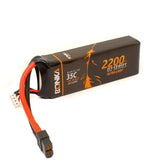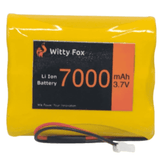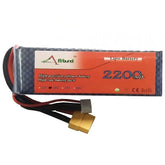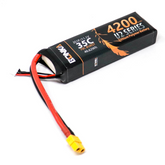Lithium-Ion vs Lithium-Polymer Battery – Which One Should You Choose?
Summary
Do you want to delve into the intricacies of li ion vs li polymer batteries and understand their differences? If the answer is yes! then check out this blog post which covers everything about lithium-ion and lithium-polymer batteries from what each type of battery is and their respective advantages and disadvantages. This informative blog post will be of great interest to anyone who uses batteries in their daily life, providing insight into which type of battery is best for their needs.
Li po vs Li ion Battery
When it comes to portable power, lithium batteries are the best option for portable power due to their effectiveness, longevity, and adaptability. Lithium-ion (Li-ion) and lithium polymer (LiPo) batteries are the two primary varieties. Although they both employ lithium, their chemistry, designs, and functionalities differ. Selecting the appropriate battery for robotics applications, electric cars, RC, UAV, and UAS applications requires an understanding of the distinctions.
Before moving to the comparison of the Lipo vs Li ion battery, we have to first understand, what Lithium-ion and Lithium-polymer batteries are.
What is a Lithium-Ion Battery?

Lithium-ion batteries (LIB) are a family of rechargeable batteries having high energy density and are commonly used in consumer electronics. Unlike the disposable lithium primary battery, a LIB uses an intercalated lithium compound instead of metallic lithium as its electrode.
Usually, LIBs are significantly lighter than other kinds of rechargeable batteries of similar size. LIBs are heavily used in portable electronics. These batteries can be commonly found in PDAs, iPods, cell phones, laptops, etc. This term is also known as an LI-ion.
Lithium ions move from the negative electrode (anode) to the positive electrode (cathode) when a LIB is discharging (cathode). Lithium ions move in the opposite direction when a LIB is charging; the negative electrode becomes the cathode, and the positive electrode becomes the anode.
Advantages of Lithium-Ion batteries
Pros of Li Ion Batteries: Why Choose Li Ion over Li Polymer?
- A typical LIB can store 150 watt-hours of electricity per kg of battery, compared to 100 watt-hours in a nickel-metal hydride (NiMH) battery and only 25 watt-hours in a lithium-ion battery.
- LIBs hold a charge well. They usually lose approximately 5% of their charge each month, against a 20% monthly loss for NiMH batteries.
- LIBs do not require complete discharge before recharging.
- LIBs can handle more charge/discharge cycles.
Find the best deals on 3.7V 18650 Li-Ion Battery.
Disadvantages of Lithium-ion Batteries
- The LIBs start to degrade the moment they leave the factory. They usually last for only two to three years from the date of manufacture, regardless of whether used or unused.
- LIBs are highly sensitive to higher temperatures. Higher temperature leads to a much faster degradation rate than normal.
- If a LIB is fully discharged, it gets damaged.
- LIBs are comparatively expensive.
- There exists a small possibility that if the LIB pack fails, it may burst open into flame.
What is a Lithium Polymer Battery?

A lithium polymer battery (LiPo, LIP, or Li-Poly) is a rechargeable battery with a soft polymer casing and a soft external "pouch" for the lithium-ion battery inside. It could also be a lithium-ion battery with a gelled polymer as the electrolyte. However, the term is most commonly used to describe a type of lithium-ion battery that comes in a pouch. The more accurate name for this type of battery is lithium-ion polymer battery.
Lithium-polymer batteries are lighter and more flexible than other kinds of lithium-ion batteries because of their soft shells, allowing them to be used in mobile and other electronic devices, as well as in remote control vehicles.
Lithium-Polymer (LiPo) batteries are the latest iteration of rechargeable battery technology. They have a number of advantages over other types, such as the Li polymer battery having higher energy density and longer service life due to their pouch cell construction that uses less space than traditional cylindrical cells. LiPo batteries also boast better performance in high temperature environments because they can handle larger charge/discharge currents with more stability compared to other chemistries. The thin film packaging reduces possible damage from physical shock or vibration, while also enabling these power sources to be lighter weight for applications requiring portability or mobility like drones and wireless speakers. Finally, greater flexibility creates opportunities for customizing design size when powering consumer electronics, including smartphones and tablets, making them an ideal choice wherever reliability is essential!
The lithium polymer batteries (LIPO) are most commonly used in mobile devices, power banks, very thin laptop computers, portable media players, wireless controllers for video game consoles, wireless PC peripherals, electronic cigarettes, and other applications where small form factors are considered.
Advantages of the LiPo battery
Pros of Li Polymer Batteries: Why Choose Li Polymer over Li Ion?
- Li polymer battery offers high specific energy compared to other lithium batteries.
- It is used in lightweight devices such as smartphones and thin laptops as well as smart wearables due to its lightweight and compact size.
- Lithium Polymer battery offers high capacity and hence can be used to hold more power.
- Li polymer battery is safe from explosion, unlike Li-Ion battery.
- It does not lose its charging capacity as fast as a Li-Ion battery. Hence, its life span is greater than 1000 times which is higher than a Li-Ion battery. The lithium polymer battery charging time is very short.
Disadvantages of LiPo Battery
- Li polymer battery supports fewer recharge cycles, which is about 300 to 400 cycles.
- Its chemistry leads to fire when the LiPo battery is punctured.
- Lithium polymer battery requires special care during charging, discharging, and storage.
- Li polymer battery is expensive. The cost is almost double that Li-Ion battery.
Comparison between Lithium-Ion and Lithium Polymer Batteries

Lipo vs Li ion battery comparison table based on their specification:
Specifications |
Lithium-Ion Battery |
Lithium Polymer Battery |
Energy density, WH/Kg |
Higher, 100 to 250 |
Lower, 130 to 200 |
Cost |
Cheap |
Expensive, almost double that Li-Ion |
Size |
Big |
Slim |
Chances of explosion when overcharged |
It likes to explode if not handled with care |
Safe from explosion |
Battery Life |
The charging capacity is reduced over time. Life span < 100 times |
It does not lose its charging capacity as much as compared to Lithium-Ion. Lithium polymer battery life span > 1000 times |
Duration of charging |
Long |
Short |
Weight |
Heavier |
Light in Weight |
Conversion rate |
About 85 to 95 % |
About 75 to 90 % |
Nominal cell voltage |
3.2 V |
3.7 V |
Safety concern |
Not stable |
Stable |
Environment concern |
Very dangerous |
Somehow |
Li Po vs Li ion battery Which One to Choose?
Before choosing Li ion vs Li polymer, you need to identify your needs.
- LiPo batteries are ideal for thin designs since they are lighter and more pliable in shape. Wearables and drones are among the applications where they are desired.
- Because of their solid construction, Li-ion batteries offer superior safety and a higher energy density. They work well with gadgets like laptops and electric cars.
To choose the ideal alternative for you, take into account elements like energy density, safety, and the intended use. When it comes to selecting between Lipo vs Li ion battery never get confused again.
Conclusion
In this blog post, we have learned about Lipo vs Lithium-ion and what Lithium-ion and lithium-polymer batteries are subject to advantages and disadvantages. Lithium-ion batteries are ubiquitous and yield heightened energy density, whereas lithium-polymer batteries provide greater pliancy in terms of structure and better safety. Ultimately, one's preferences and specific needs will determine whether to opt for one over the other. Regardless of the type of battery you select, it's evident that lithium-based technology has been a game-changer in the realm of powering our gadgets and will continue to play an indispensable role for many years to come. Hence, it's crucial to stay abreast of the upsides and downsides of various battery types, such as lithium-ion and lithium-polymer, to remain up-to-date with the latest technology trends.
If you understand Li ion vs LiPo and appreciate our work, don't forget to share this post and leave your opinion in the comment box.
Please do check out other blog posts about Popular Electronics
Check out other related blog post about batteries What is AH in Battery , Automatic Battery Charging Circuit , How to Charge LiPo Battery and How to Use IMAX B6 Multifunction Charger for LiPo Batteries
Make sure you check out our wide range of products and collections (we offer some exciting deals!)
Excerpt
Frequently Asked Questions
1. What is a lithium-ion battery used for?
The lithium-ion battery, a reservoir of electrical potential, finds employment in sundry contrivances ranging from handheld communicators to personal computers, motorcars and mechanical implements. Its reputation for elevated energy density, negligible self-discharge, and extended longevity precedes it. Functioning on the basis of an intricate interplay of lithium ions and a cathode medium, it engenders power via a chemical reaction and may be rejuvenated using a supplementary external power source.
2. What are lithium-polymer batteries for?
3. Which battery is better lithium or polymer?
Lithium-polymer batteries are rechargeable batteries that use a soft polymer casing and lithium-ion for one of the electrodes. They are commonly used to power commercial and hobby drones, radio-controlled aircraft, radio-controlled cars, and large-scale model trains due to their lower weight and increased capacity and power delivery. Lithium-polymer batteries differ from lithium-ion batteries in that they use a polymer electrolyte rather than a liquid electrolyte
4. Lithium-ion vs Lithium polymer which is safer?
5. Li-ion vs Li-polymer which is best for mobile?
Lithium-ion batteries are generally more effective and prevalent than lithium-polymer batteries. They have better density and high power capacity than lithium-polymer batteries, and they also last longer on average. They are also more versatile in terms of their size and shape, making them suitable for smaller devices.
6. Which is better LiPo or Li-ion battery for drone?
On the other hand, lithium-polymer batteries are more robust and flexible in terms of their build, making them suitable for high-power use. They also have an extremely low self-discharge rate, meaning they can retain their charge for a longer period of time. Additionally, lithium-polymer batteries are safer than lithium-ion batteries due to their robust packaging.
7. Can I replace LiPo with Li-ion battery?
8. What is the difference between lithium-ion and lithium-polymer batteries?
Lithium-ion batteries are typically cylindrical or prismatic and have a liquid electrolyte, while lithium-polymer batteries use a gel-like or solid electrolyte and are often flatter. Lithium-polymer offers flexible designs and is lighter, making it popular in portable devices. However, lithium-ion generally provides higher energy density, making it more suitable for applications needing prolonged power.
9. Are lithium-polymer batteries safer than lithium-ion?
While lithium-polymer batteries can be safer due to their less volatile design, they still carry risks. Lithium-ion batteries can overheat and face a greater risk of catching fire if damaged. It's essential to handle both types with care, ensure proper charging, and avoid exposing them to extreme temperatures to maintain safety.
10. Which battery type offers higher energy density?
Lithium-ion batteries usually offer higher energy density compared to lithium-polymer batteries. This means that lithium-ion can store more energy in a smaller package, making them ideal for applications where space and weight are critical, such as in laptops and electric vehicles.
11. Can I use a Li-polymer battery instead of a Li-ion in my project?
In some cases, you can use a lithium-polymer battery instead of a lithium-ion battery, but it's crucial to ensure compatibility with your device's voltage and current specifications. Also, consider the physical size, weight, and overall performance requirements to avoid potential issues during operation.
12. What are the charging differences for Li-ion and Li-poly?
Lithium-ion batteries generally have a more straightforward charging process, using a constant current/constant voltage method. Lithium-polymer batteries may require specific charging protocols to avoid overcharging. Always use the recommended charger for each type to ensure safety and longevity of the batteries.
13. Which battery type is better for drones and RC models?
Lithium-polymer batteries are often preferred for drones and RC models due to their lightweight design and high discharge rates. They provide better performance for rapid bursts of energy needed during flight. Their customizable shapes also fit better into various aircraft designs.
14. What are the limitations of Li-ion batteries?
Lithium-ion batteries have a limited lifespan, typically around 2-3 years or 300-500 charge cycles. They can be sensitive to extreme temperatures and may not function optimally in very high or low conditions. Additionally, they can catch fire if damaged, requiring careful handling.
15. How do I safely store lithium-polymer batteries?
Store lithium-polymer batteries in a cool, dry place away from direct sunlight. Ideally, maintain a charge level between 30-50% for long-term storage. Use a fireproof bag or container for added safety and avoid storing them near flammable materials to minimize risks.
16. How long do Li-ion and Li-poly batteries last in typical use?
Lithium-ion batteries generally last around 2-3 years or 300-500 charge cycles, while lithium-polymer batteries can have a similar lifespan but may degrade slightly faster under heavy use. Regular maintenance and appropriate charge levels can help extend their usable life.
17. What factors affect the lifespan of lithium batteries?
The lifespan of lithium batteries is influenced by charge cycles, temperature, and usage patterns. Frequent deep discharges and high temperatures can degrade the battery faster. Additionally, keeping batteries charged at optimal levels and avoiding exposure to extreme conditions can enhance longevity.
1. What is a lithium-ion battery used for?
The lithium-ion battery, a reservoir of electrical potential, finds employment in sundry contrivances ranging from handheld communicators to personal computers, motorcars and mechanical implements. Its reputation for elevated energy density, negligible self-discharge, and extended longevity precedes it. Functioning on the basis of an intricate interplay of lithium ions and a cathode medium, it engenders power via a chemical reaction and may be rejuvenated using a supplementary external power source.
2. What are lithium-polymer batteries for?
3. Which battery is better lithium or polymer?
Lithium-polymer batteries are rechargeable batteries that use a soft polymer casing and lithium-ion for one of the electrodes. They are commonly used to power commercial and hobby drones, radio-controlled aircraft, radio-controlled cars, and large-scale model trains due to their lower weight and increased capacity and power delivery. Lithium-polymer batteries differ from lithium-ion batteries in that they use a polymer electrolyte rather than a liquid electrolyte
4. Lithium-ion vs Lithium polymer which is safer?
5. Li-ion vs Li-polymer which is best for mobile?
Lithium-ion batteries are generally more effective and prevalent than lithium-polymer batteries. They have better density and high power capacity than lithium-polymer batteries, and they also last longer on average. They are also more versatile in terms of their size and shape, making them suitable for smaller devices.
6. Which is better LiPo or Li-ion battery for drone?
On the other hand, lithium-polymer batteries are more robust and flexible in terms of their build, making them suitable for high-power use. They also have an extremely low self-discharge rate, meaning they can retain their charge for a longer period of time. Additionally, lithium-polymer batteries are safer than lithium-ion batteries due to their robust packaging.
7. Can I replace LiPo with Li-ion battery?
8. What is the difference between lithium-ion and lithium-polymer batteries?
Lithium-ion batteries are typically cylindrical or prismatic and have a liquid electrolyte, while lithium-polymer batteries use a gel-like or solid electrolyte and are often flatter. Lithium-polymer offers flexible designs and is lighter, making it popular in portable devices. However, lithium-ion generally provides higher energy density, making it more suitable for applications needing prolonged power.
9. Are lithium-polymer batteries safer than lithium-ion?
While lithium-polymer batteries can be safer due to their less volatile design, they still carry risks. Lithium-ion batteries can overheat and face a greater risk of catching fire if damaged. It's essential to handle both types with care, ensure proper charging, and avoid exposing them to extreme temperatures to maintain safety.
10. Which battery type offers higher energy density?
Lithium-ion batteries usually offer higher energy density compared to lithium-polymer batteries. This means that lithium-ion can store more energy in a smaller package, making them ideal for applications where space and weight are critical, such as in laptops and electric vehicles.
11. Can I use a Li-polymer battery instead of a Li-ion in my project?
In some cases, you can use a lithium-polymer battery instead of a lithium-ion battery, but it's crucial to ensure compatibility with your device's voltage and current specifications. Also, consider the physical size, weight, and overall performance requirements to avoid potential issues during operation.
12. What are the charging differences for Li-ion and Li-poly?
Lithium-ion batteries generally have a more straightforward charging process, using a constant current/constant voltage method. Lithium-polymer batteries may require specific charging protocols to avoid overcharging. Always use the recommended charger for each type to ensure safety and longevity of the batteries.
13. Which battery type is better for drones and RC models?
Lithium-polymer batteries are often preferred for drones and RC models due to their lightweight design and high discharge rates. They provide better performance for rapid bursts of energy needed during flight. Their customizable shapes also fit better into various aircraft designs.
14. What are the limitations of Li-ion batteries?
Lithium-ion batteries have a limited lifespan, typically around 2-3 years or 300-500 charge cycles. They can be sensitive to extreme temperatures and may not function optimally in very high or low conditions. Additionally, they can catch fire if damaged, requiring careful handling.
15. How do I safely store lithium-polymer batteries?
Store lithium-polymer batteries in a cool, dry place away from direct sunlight. Ideally, maintain a charge level between 30-50% for long-term storage. Use a fireproof bag or container for added safety and avoid storing them near flammable materials to minimize risks.
16. How long do Li-ion and Li-poly batteries last in typical use?
Lithium-ion batteries generally last around 2-3 years or 300-500 charge cycles, while lithium-polymer batteries can have a similar lifespan but may degrade slightly faster under heavy use. Regular maintenance and appropriate charge levels can help extend their usable life.
17. What factors affect the lifespan of lithium batteries?
The lifespan of lithium batteries is influenced by charge cycles, temperature, and usage patterns. Frequent deep discharges and high temperatures can degrade the battery faster. Additionally, keeping batteries charged at optimal levels and avoiding exposure to extreme conditions can enhance longevity.












